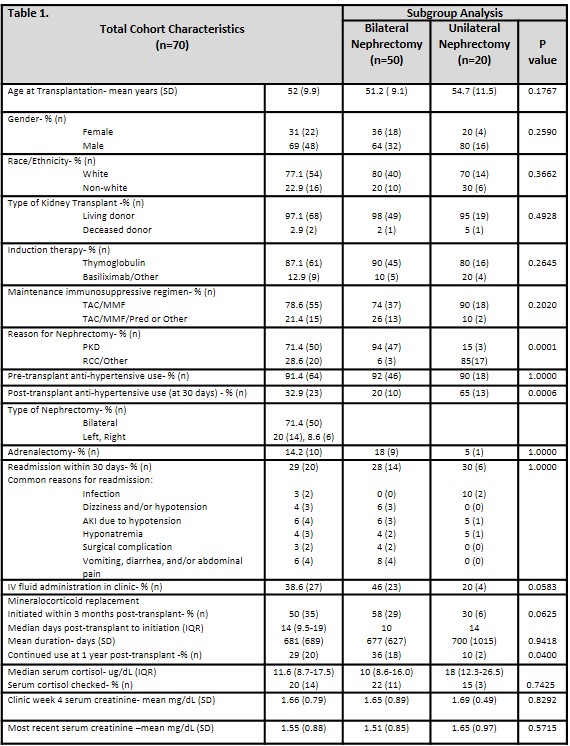Native Nephrectomy at the Time of Transplant: Risk for Adrenal Injury?
1Nephrology, NY Presbyterian- Weill Cornell, New York, NY, 2Surgery, NY Presbyterian- Weill Cornell, New York, NY
Meeting: 2020 American Transplant Congress
Abstract number: D-079
Keywords: Adverse effects, Kidney, Kidney transplantation, Nephrectomy
Session Information
Session Name: Poster Session D: Kidney Technical
Session Type: Poster Session
Date: Saturday, May 30, 2020
Session Time: 3:15pm-4:00pm
 Presentation Time: 3:30pm-4:00pm
Presentation Time: 3:30pm-4:00pm
Location: Virtual
*Purpose: Living donor studies have demonstrated that native nephrectomy (Nx) is associated with transient but symptomatic loss of adrenal function. Although surgical complications from simultaneous Nx are now less frequent, the medical morbidity and post-transplant management of these patients has not been well described.
*Methods: We retrospectively reviewed patients at our institution that underwent Nx at the time of kidney transplantation who had at least 3 months follow up from 1/2012 to 8/2019.
*Results: During the study period 70 patients had a Nx at the time of kidney transplant, of which 71.4% underwent bilateral Nx and 14.2% had documented adrenalectomy. Patient characteristics are listed in Table 1. Most patients (91.4%) were on anti-hypertensive therapy prior to transplant. Patients who underwent unilateral Nx had similar baseline systolic blood pressures (SBP) as those who had bilateral Nx. Post-transplant average SBP was significantly lower in the bilateral group (Figure 1), although this was not associated with adrenalectomy. 50% of all patients required mineralocorticoid replacement (MCR) by 3 months, initiated at a median of 14 days post-transplant and 29% remained on MCR at 1 year (Table 1). Patients who received bilateral Nx were more likely to receive IVF in post-operative clinic visits, 46% vs 20 % (p=0.06), require MCR within 3 months of transplant, 58% vs 30% (p=0.06), and remain on MCR at 1 year, 36% vs 10% (p= 0.04). Rates of 30-day readmissions, in the bilateral group were more likely to be related to dizziness and acute kidney injury that responded to IVF and MCR. Median serum cortisol levels were on the lower limit of normal in both groups. Both groups had excellent graft function at 4 weeks and at a median follow up of 1423 days.
*Conclusions: Simultaneous bilateral Nx and kidney transplant is associated with excellent outcomes, despite significant hypotension and a high rate of MCR in the early post-transplant setting. Pathologic evidence of adrenalectomy is not enough to predict the need for MCR post-operatively. Transplant centers should be aware that patients undergoing bilateral Nx may potentially benefit from the early use of MCR to mitigate medical morbidity.
To cite this abstract in AMA style:
Salinas T, Dadhania D, Lee J, Aull M, Kapur S, Lubetzky M. Native Nephrectomy at the Time of Transplant: Risk for Adrenal Injury? [abstract]. Am J Transplant. 2020; 20 (suppl 3). https://atcmeetingabstracts.com/abstract/native-nephrectomy-at-the-time-of-transplant-risk-for-adrenal-injury/. Accessed February 16, 2026.« Back to 2020 American Transplant Congress


